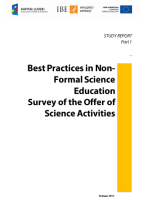Best Practices in Non-Formal Science Education
- Published on Monday, 14 July 2014 03:18
 The report “Best Practices in Non-Formal Science Education. Survey of the Offer of Science Activities” is based on the studies conducted by Research Institute Millward Brown SMG/KRC S.A. for the Educational Research Institute. The main objective of the study was to determine the manner in which the offer of science activities addressed by centres of non-formal education to groups of pupils supervised by teachers may contribute to promoting and developing scientific reasoning, an ability that is essential in science education. The research also allowed for identification of examples of best practices in the area in question.
The report “Best Practices in Non-Formal Science Education. Survey of the Offer of Science Activities” is based on the studies conducted by Research Institute Millward Brown SMG/KRC S.A. for the Educational Research Institute. The main objective of the study was to determine the manner in which the offer of science activities addressed by centres of non-formal education to groups of pupils supervised by teachers may contribute to promoting and developing scientific reasoning, an ability that is essential in science education. The research also allowed for identification of examples of best practices in the area in question.
Results of both stages of the research indicate that non-formal education centres in Poland have a significant potential and may be considered a valuable addition to the sector of formal education. Almost half of the centres that participated in the ERI research in 2011 define their range of work as regional in the area of a voivodeship and one third of them as national. They mostly focus on cyclical and repetitive activities, which allow more groups to come back to the centre. The offer of the centres surveyed by the ERI associates includes, in the greatest part, activities supporting science, biology and geography. The offer of physics and chemistry is relatively poorer, which may be related to higher costs and smaller number of interested pupils (science or biology classes are addressed to preschool and primary school pupils). The didactic offer is usually based on in-house programmes; one in five centres prepares classes based on the curriculum. The methodology of classes is varied – centres not only offer expository activities (lectures, showing round the museum exposition), but also activities that potentially support development of abilities important in science education (workshops, labs).
Download "Best Practices in Non-Formal Science Education. Survey of the Offer of Science Activities" [pdf, 1.6MB]
.






